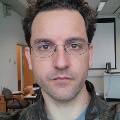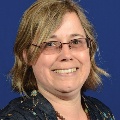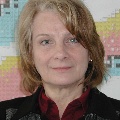Durham University
Ted Schrecker
The new professor of global health policy at Durham University said he felt “sheer delight” when offered the post. Ted Schrecker, associate professor in the department of epidemiology and community medicine at the University of Ottawa, said he looked forward to Durham’s “distinctive and wonderful multidisciplinary environment”. He added: “I hope to bring the perspective of critical globalisation studies to health policy issues. Perhaps the most important message I would like to convey is that, in rich and poor countries alike, public finance is a public health issue.” He is keen to bring to Durham his current research ideas in fields including the politics of “scarcity” and health and economic and social rights in an era of crisis. After studying at Trent and York universities in Canada, he took his doctorate at the University of Western Ontario. Professor Schrecker, who will be based at Durham’s Queen’s campus in Stockton-on- Tees, has taught at Trent and Western Ontario and at the Bruyère Research Institute in Ottawa.

University of Lincoln
Oscar Martinez Mozos
Having been appointed lecturer in computer science at the University of Lincoln’s Centre for Autonomous Systems, Oscar Martinez Mozos recalled that one of his immediate thoughts on being offered the position was that he was glad to be returning to Europe. “I was missing life and work in Western-style universities,” he said, adding that he loved the “very ironic” British sense of humour. A Spanish native who has worked in Germany and Japan, Dr Mozos said he would like to “put all the international experience and knowledge into the service of the students at Lincoln”. He added: “Being able to understand different ways of thinking and to discuss different ideas is the key for success in the global market.” His research focuses on robotic perception, intelligent sensors, machine learning and bio-engineering. “I like robots because although they need plenty of artificial intelligence, algorithms and programs, they should work and interact in the real world.” After studying at the universities of Alicante and Freiburg, Dr Mozos worked at the University of Zaragoza, the Technical University of Munich and, most recently, Kyushu University in Fukuoka, Japan.

University of Roehampton
Caroline Ross
The new head of the department of life sciences at the University of Roehampton said she was “quite excited, pleased and slightly scared” about taking on the role. Caroline Ross, who has worked at the university for 20 years, said she would be looking ahead not only to the upcoming research excellence framework in 2014, but also to the 2020 REF. “We’ve got some very high-quality research going on in the department, so we want to maintain that while encouraging staff, and particularly young members of staff, to produce research,” she said. She also argued that it was crucial to maintain and enhance the student base at undergraduate and postgraduate level. Dr Ross, an evolutionary anthropologist whose research focuses on primate socioecology, is currently director of the Baboon Research Centre at the Gashaka Gumti National Park in Nigeria. She hoped she would be able to continue her research, even if only “vicariously through my PhD students”. Dr Ross added that her route into primate research came by chance. “I went to my supervisor as an undergraduate and asked who I could study with, and he happened to be a primatologist. He could have sent me off to someone who studied fruit flies!” Dr Ross was at the University of Sussex before moving to University College London for her PhD, and was a postdoctoral student at Durham University before moving to Roehampton.

University of Manchester
Melissa Denecke
The news that she had been appointed co-director of the Dalton Nuclear Institute at the University of Manchester came as something of a shock to Melissa Denecke, who was told that she had got the job just before boarding her flight back to Germany after her interview. “They were calling my flight to go, so I was a bit dazed, but of course very happy,” she said. Professor Denecke, currently a senior scientist at the Karlsruhe Institute of Technology, will take up her new post in July. Besides looking to contribute to Dalton’s record in “promoting cooperation between academia and industry in nuclear energy research, effectively communicating nuclear-related issues, and in educating the workforce for tomorrow”, and bringing an “international accent” to the institute, she said she has a personal goal as a female academic. “I am a female and a mother, and [by taking this role] you’re a role model for young women in the natural sciences and engineering fields.” She acknowledged that her field has its opponents, and she said one of the major challenges is “securing public acceptance” of the need for nuclear energy. Professor Denecke studied at Carroll College (now Carroll University) in Wisconsin, and then the University of Hamburg, where she gained the equivalent of an MSc and a PhD. She has held posts at Hamburg, the Helmholtz-Zentrum Dresden-Rossendorf and the Offenburg University of Applied Sciences.
Other changes
Pioneers in the fields of computing, climate modelling, virtual surgery and the internet are among the experts honoured as new fellows of the Royal Society. Lord Darzi, professor of surgery at Imperial College London, has been honoured for his contributions to the quality and safety of surgery. Jon Crowcroft, Marconi professor of communications systems at the University of Cambridge, has been acknowledged for his contributions to the development of the internet, including techniques that paved the way for rural broadband. Joanna Haigh, professor of atmospheric physics at Imperial College London, has been made a fellow for her leadership in the area of solar influences on the middle atmosphere.
Kingston University has appointed several high-profile figures from the world of art and design. Daniel Charny, who curated the 2011 Victoria and Albert Museum exhibition Power of Making, has become professor of design, and installation artist Mike Nelson, twice nominated for the Turner Prize, has been made professor of fine art. Product designer Marloes ten Bhömer and interior designer Ben Kelly have been named research fellows.
Roger Phillips, a broadcaster for BBC Radio Merseyside, has joined Liverpool Hope University as visiting professor in broadcast journalism. He will teach media and communications students about radio broadcasting and careers in the media.
Plymouth University Peninsula Schools of Medicine and Dentistry have made two new appointments. Tom Gale and Steven Burr have been named director of assessment and deputy director of assessment, respectively. Dr Gale is a consultant anaesthetist at Plymouth Hospitals NHS Trust and currently director of clinical skills at the schools. Dr Burr recently joined from the University of Nottingham’s medical school, where he held significant responsibilities for assessment.
To send submissions - with pictures - to the People section email: people@tsleducation.com
Register to continue
Why register?
- Registration is free and only takes a moment
- Once registered, you can read 3 articles a month
- Sign up for our newsletter
Subscribe
Or subscribe for unlimited access to:
- Unlimited access to news, views, insights & reviews
- Digital editions
- Digital access to THE’s university and college rankings analysis
Already registered or a current subscriber?
